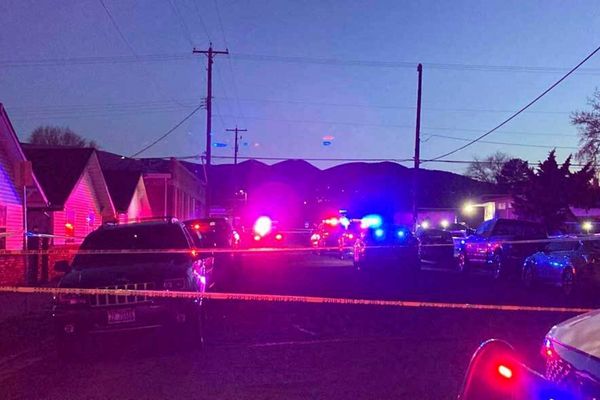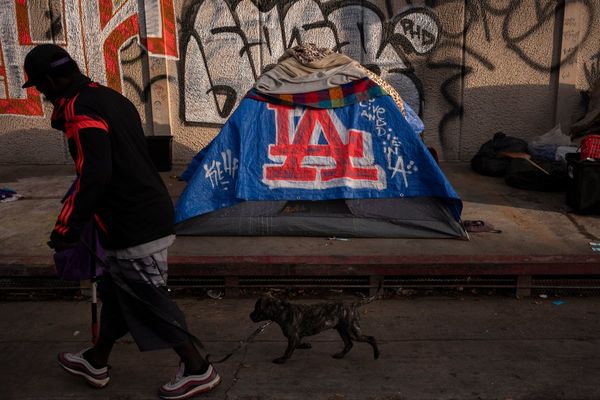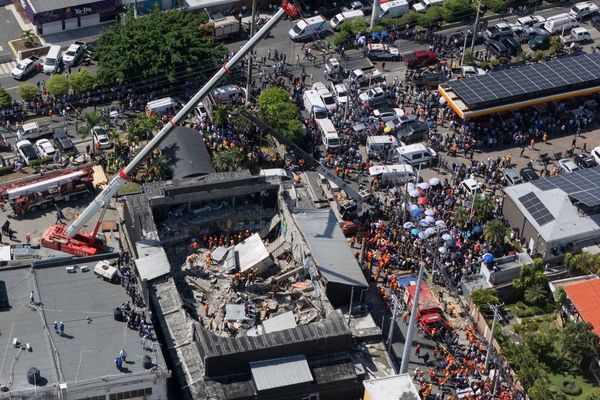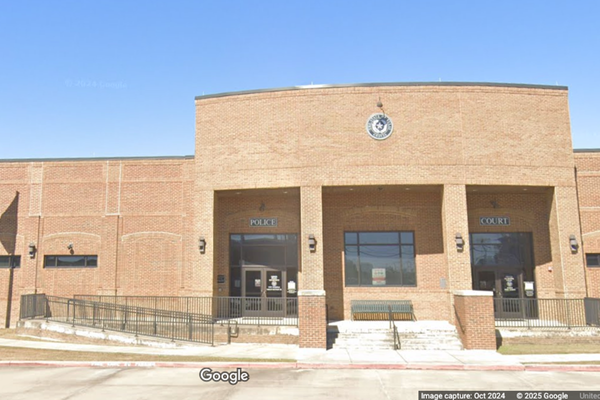
On a slight incline overlooking FC Kryvbas’s training facilities, the skeletal frame of a mining tower sets slowly into action. Its wheels turn intermittently, deliberately, helping drag a city’s lifeblood closer to the fresh air. Down by the gates an elderly man materialises from a side path at the first sign of visitors, hawking a plastic bag half-full of cherries. They are in season, glistening and juicy; there will be plenty more where those came from, should the volume of sales match his optimism.
Inside, Yuriy Vernydub has work of his own. He jokes that the last year of his life would make a film script but the immediate reality is, true to his oeuvre, about the next game. There is a competitive match to prepare for: Kryvbas will face Kolos Kovalivka near Kyiv on Tuesday, the first day of the 2022-23 Ukrainian Premier League season.
Soon the heavens will open. While thunder and lightning compete for attention overhead his players will be sent out of their indoor dome and on to the grass pitch so they can perfect their off-the-ball shape. They are 40km from the Russian frontline; overnight there have been barrel bombings to the south, and these weather conditions are water off a footballer’s back.

“Of course I have some fears about starting the league now, any smart person would,” Vernydub says. “It’s probably the first time in history that a championship will be played during the middle of a war. But I’ve seen real shelling with my own eyes, so I’m less scared.”
This is Kryvyi Rih: the sprawling, snaking city that dominates central Ukraine’s industrial heartland. Its people are tough, plain-speaking, more than half of them working in the metallurgy industry whose edifices dominate every stretch of the landscape.
Kryvbas are accordingly belligerent: they will not relocate to Kyiv, as others have done, even if areas on the city’s periphery are frequently being shelled and the troubling spectre of the Enerhodar nuclear power station looms 60 miles to the south-east. The city is protected by four lines of defence and cannot be entered without passing a series of army checkpoints.
In June, the club told its rivals to forget any idea of playing league games abroad, saying there is “no other option, neither from a moral point of view nor from sporting principle” than to compete domestically.
The same month, Vernydub became manager. “It has to happen here, in our land,” he says. “It’s very important to our soldiers, our warriors, that we do it.”
Vernydub knows why. Last September, his Sheriff Tiraspol team caused astonishment by winning at Real Madrid in the Champions League. But he watched the Spanish side beat Liverpool in the final via a patchy television feed with his artillery unit, not far from Kryvyi Rih.

On the day Russia invaded Ukraine he was coaching Sheriff in a Europa League tie against Braga; within hours he was on the way back home to Zaporizhzhia and, at 56, volunteering for the army draft. “I paid virtually no attention to football,” he says, explaining how returning fire towards the invaders became his daily focus. “I think every man would do the same.”
When it was time to come back, the offer from Kryvbas’ president, Kostyantyn Karamanits, suited him. Karamanits had donated help to Vernydub’s army division so the favour was returned.
“Presidents of other clubs talk a lot about their assistance but this one helps a lot without talking too much,” he says. “This is a truly patriotic, real Ukrainian club.”
***
Viacheslav Riabov is a veteran midfielder, Kryvyi Rih born and bred, who speaks an essential truth: “The soul of this city is underground.” A portion of it plunges 160m below sea level and, remarkably, is hewn only a mile from the centre.
Pivdennyi quarry is a cavernous, disorientating moonscape operated by Rudomain, the club’s sponsor. There are more than 50 mines, quarries and plants in the area and this is by no means the biggest. Trucks haul iron ore from top to bottom, the round trip of about an hour taking place up to 10 times a day, but in wartime the facility has operated at around 20% capacity with transportation options restricted.
“I’m amazed every day I come to work,” says Oleg Podkopaiev, the quarry’s deputy director and a Kryvbas fan. He worries that, within three decades, the ore may have been exhausted and that his home city may come to resemble Detroit. Everything in Kryvyi Rih is built around this blue mineral and its football club would not exist without it.
“Kryvbas is at the heart of our city and community,” Podkopaiev, a jovial 40-year-old, says. “It’s absolutely necessary for morale here that the club starts playing again. We have to go on living.”
Kryvbas and their supporters have tried to help their compatriots do exactly that. Pavlo Petrechenko, a matchgoer since 1997, is a member of the Old School fan sector and recounts how they set up a joint bank account with the club to collect donations for medical supplies, pickup trucks, drones and other equipment to help the military. Many of the group went to fight at the front; four have already died in places such as Mariupol and Kharkiv oblast.
“We know it may end up being more,” he says. “When we play our first game back in Kryvyi Rih, we will do something to honour them. This city is strong; the orcs got a bit close but we withstood, because our people have iron strength.”

When he was younger, Petrechenko shared a stage with Volodymyr Zelenskiy, Kryvyi Rih’s most famous son and a driving force of Kryvbas’ recent revival. The pair were comedians: Zelenskiy’s group, Kvartal 95, would face the Punks troupe featuring Petrechenko in local talent shows during the 1990s.
Artem Gagarin, the vice-president of Kryvbas, was a few years their junior and considered one of the president’s comic proteges. Petrechenko shakes his head and laughs when asked if he sensed his contemporary was set for a career in high office. “But he’s proved everyone wrong,” he says. “He got lots of criticism before the war and has shown the true Kryvyi Rih character.”
It helped him to the top and may ensure Ukraine prevails, too. Riabov knows what the miners and their peers have wrought. “There has always been a winners’ spirit here,” he says.
***
It is a bright Saturday morning. The previous day’s downpour is a distant memory but some things remain constant. A couple of hours ago, four Kalibr cruise missiles were shot down above Dnipro, 85 miles north-east, and the awful wail of air raid sirens echoed around Kryvyi Rih. Most of the public continue as if impervious: the unique underground trams on the metro keep shuddering along; a couple walk along the pavement sharing the weight of a huge, vibrant basket of flowers.
At the Kryvbas training ground, Volodymyr Baienko is carrying on too. He has just travelled overnight from western Ukraine, where he was negotiating with potential new signings. Putting a squad together has been no mean feat. “On 7 April we only had five players here,” he says.
The first team had been on a training camp in Turkey when the war began and within a fortnight Baienko knew he would have to allow many of the squad, Riabov included, to continue their careers abroad on loan. Others would depart permanently. For a 32-year-old whose playing career ended in June 2021 before he moved to an upstairs role at Kryvbas, this year has presented the steepest of learning curves.

“Look around, look at everyone working,” he motions, wearing a sharp white shirt and looking every inch the urbane young executive. Tractors carry gravel to one of several areas of the complex that are being renovated; young players train on a faraway pitch; administrative staff in red shirts scurry around. “When people are working they are reassured that all will be well.
“Some people say that because of war you can’t work or plan. But my opinion is that, despite its horrors, the war can be viewed as a chance. While others have hesitated we’re moving forward, because we’ve got ambitious targets. And when Ukraine has won the war, we will be ahead of everyone.”
Kryvbas are, to all intents and purposes, a successor to the old Kryvbas club that went bankrupt in 2013 and twice played in the Uefa Cup. They always played to big, baying crowds, by the standard of Ukraine’s regions. In 2020, they were renamed from Hirnik Kryvyi Rih, a short-lived successor, upon an instruction personally made by Zelenskiy. When they played FC Cherkaschnya in their first game under the old name a year ago, Zelenskiy was there to kick the first ball; the club were promoted to the top flight and feel slick, driven, purposeful.
The coup of Vernydub’s arrival demonstrates that and so does the fact players such as the Croatian defender Dragan Lovric have been happy to return for the new campaign. Lovric, injured while his teammates were in Turkey, saw bombs fall near Kryvyi Rih in February and had to spend 50 hours driving back home to Split, but knew he would be back at the first opportunity.
“Some others from my country have offers from this club but they don’t believe me, they think I’m a little crazy and can’t believe it is virtually normal life here,” he says. “I tell them to come; I think it’s safe, even though nobody knows what’s coming next.
“I think people here were surprised to see me return, but we see hope here. Nobody believed we could be in a footballing situation so soon but we want to show the world we are not afraid.”
Lovric hopes Kryvbas will be allowed to play home games in Kryvyi Rih; it could happen soon, perhaps as early as next month. Iron will pays no deference to danger, on the football field or elsewhere.
“From the very first days of war I knew Ukraine will not lose,” Baienko says. “I witnessed the war in Donetsk when it began in 2014, and I know the Ukrainians are unbreakable people. We are building our mentality, building our history.”
High above him, those steel pully wheels keep inching round and round. Life moves on; the mines keep working; against the odds, football is returning.







